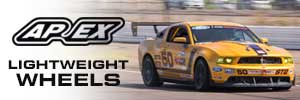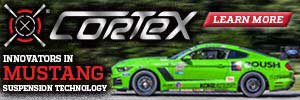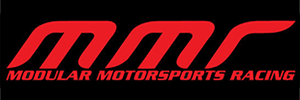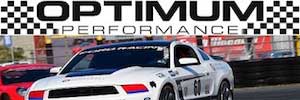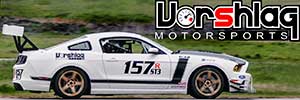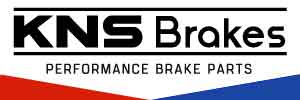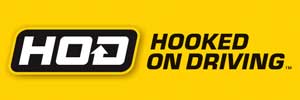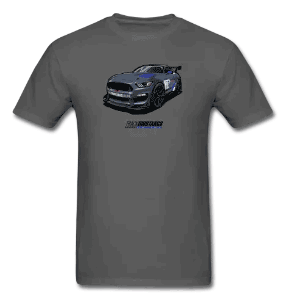- Welcome to the Ford Mustang forum built for owners of the Mustang GT350, BOSS 302, GT500, and all other S550, S197, SN95, Fox Body and older Mustangs set up for open track days, road racing, and/or autocross. Join our forum, interact with others, share your build, and help us strengthen this community!
You are using an out of date browser. It may not display this or other websites correctly.
You should upgrade or use an alternative browser.
You should upgrade or use an alternative browser.
S197 Best track & road brakes
- Thread starterJh_blu50
- Start date
This site may earn a commission from merchant affiliate links, including eBay, Amazon, and others.
More options
Who Replied?Dave_W
Cones - not just for ice cream
What's on the car now, and when was the last time the brake fluid was changed? Also, are you new to track days or have you run them before in something else?
You want to use at least a good DOT 4 brake fluid, or a DOT 5.1, never DOT 5. If you don't know what's in the car now, or if it's older than a year, flush with new. If it's good and fresh, you can just do a bleed before each track day, and maybe after as well. Note that "flush" is different than "bleed" - bleeding is just removing any air bubbles at the caliper; flushing is replacing all the fluid in the entire system.
For pads, there are several brands that folks here like, each with different compounds. The compound determines the temperature window the brake pad is "happy" in. "Street" pads will work from cold but will disintegrate at temps that an experienced driver can create on track. "Race" pads like to be warm/hot to work and will hold up under extreme heat, but will squeal like a stuck pig and destroy brake rotors when cold.
There are some companies that sell "street/track" pads that will probably work for someone new to track days that is not using the brakes that hard. Once you get more confidence and use the brakes harder, you'll start needing a set of pads for the street and another set for the track. Some pad manufacturers (e.g., G-Loc) have street & race compounds that are compatible with each other, so you don't need to change the rotor. Other pads may need to have their own rotor that's been bedded-in with that compound.
Note that the traction control system on the Mustang likes to apply rear brake, and can end up overheating the rear pads, and/or melting axle seals from rotor heat. If you're still building confidence on track, at least set the traction control to sport mode (car on, press brake pedal, push TC button?). Ideally, you want to turn it off completely (car on, press brake pedal, hold TC button down for 10 seconds?).
If you look at the Supporting Vendors scroll near the bottom of each forum page, you'll notice Optimum Performance (aka OP Mustang) and KNS Brakes, as well as EBC and Cobalt brake pads. Please support them if you can. OPM and KNS are both very knowledgable on Mustangs and can help put together a package that fits your current needs and has some room to grow.
Some tracks are harder on brakes than others; @Bill Pemberton will have a better idea of track-specific brake needs in your area.
Other than brakes, the number one modification I'd recommend is camber plates (Vorshlag, Maximum Motosports, Steeda, Ground Control). They will keep you from grinding off the outside shoulder of your tires, or at least reduce it. And then tires that have decent grip but can take a full session without getting greasy. For novices, seat time is the most important thing, so you want a car that is durable enough to be driven hard for an entire session, for all the sessions in a track day, and doesn't change how it responds to the same driver inputs through a session. You'll learn fastest if your car is reliable and repeatable.
I always recommend making upgrades in this order -
Make it safe.
Make it stop.
Make it turn.
Make it fast.
And remember to have fun.
You want to use at least a good DOT 4 brake fluid, or a DOT 5.1, never DOT 5. If you don't know what's in the car now, or if it's older than a year, flush with new. If it's good and fresh, you can just do a bleed before each track day, and maybe after as well. Note that "flush" is different than "bleed" - bleeding is just removing any air bubbles at the caliper; flushing is replacing all the fluid in the entire system.
For pads, there are several brands that folks here like, each with different compounds. The compound determines the temperature window the brake pad is "happy" in. "Street" pads will work from cold but will disintegrate at temps that an experienced driver can create on track. "Race" pads like to be warm/hot to work and will hold up under extreme heat, but will squeal like a stuck pig and destroy brake rotors when cold.
There are some companies that sell "street/track" pads that will probably work for someone new to track days that is not using the brakes that hard. Once you get more confidence and use the brakes harder, you'll start needing a set of pads for the street and another set for the track. Some pad manufacturers (e.g., G-Loc) have street & race compounds that are compatible with each other, so you don't need to change the rotor. Other pads may need to have their own rotor that's been bedded-in with that compound.
Note that the traction control system on the Mustang likes to apply rear brake, and can end up overheating the rear pads, and/or melting axle seals from rotor heat. If you're still building confidence on track, at least set the traction control to sport mode (car on, press brake pedal, push TC button?). Ideally, you want to turn it off completely (car on, press brake pedal, hold TC button down for 10 seconds?).
If you look at the Supporting Vendors scroll near the bottom of each forum page, you'll notice Optimum Performance (aka OP Mustang) and KNS Brakes, as well as EBC and Cobalt brake pads. Please support them if you can. OPM and KNS are both very knowledgable on Mustangs and can help put together a package that fits your current needs and has some room to grow.
Some tracks are harder on brakes than others; @Bill Pemberton will have a better idea of track-specific brake needs in your area.
Other than brakes, the number one modification I'd recommend is camber plates (Vorshlag, Maximum Motosports, Steeda, Ground Control). They will keep you from grinding off the outside shoulder of your tires, or at least reduce it. And then tires that have decent grip but can take a full session without getting greasy. For novices, seat time is the most important thing, so you want a car that is durable enough to be driven hard for an entire session, for all the sessions in a track day, and doesn't change how it responds to the same driver inputs through a session. You'll learn fastest if your car is reliable and repeatable.
I always recommend making upgrades in this order -
Make it safe.
Make it stop.
Make it turn.
Make it fast.
And remember to have fun.
- Thread starter
- #3
Thank you, all good information! It’s a low mileage 5.0 that I’m still building confidence in so in the stage of making it safe and reliable. New to track days so need seat time more than anything.What's on the car now, and when was the last time the brake fluid was changed? Also, are you new to track days or have you run them before in something else?
You want to use at least a good DOT 4 brake fluid, or a DOT 5.1, never DOT 5. If you don't know what's in the car now, or if it's older than a year, flush with new. If it's good and fresh, you can just do a bleed before each track day, and maybe after as well. Note that "flush" is different than "bleed" - bleeding is just removing any air bubbles at the caliper; flushing is replacing all the fluid in the entire system.
For pads, there are several brands that folks here like, each with different compounds. The compound determines the temperature window the brake pad is "happy" in. "Street" pads will work from cold but will disintegrate at temps that an experienced driver can create on track. "Race" pads like to be warm/hot to work and will hold up under extreme heat, but will squeal like a stuck pig and destroy brake rotors when cold.
There are some companies that sell "street/track" pads that will probably work for someone new to track days that is not using the brakes that hard. Once you get more confidence and use the brakes harder, you'll start needing a set of pads for the street and another set for the track. Some pad manufacturers (e.g., G-Loc) have street & race compounds that are compatible with each other, so you don't need to change the rotor. Other pads may need to have their own rotor that's been bedded-in with that compound.
Note that the traction control system on the Mustang likes to apply rear brake, and can end up overheating the rear pads, and/or melting axle seals from rotor heat. If you're still building confidence on track, at least set the traction control to sport mode (car on, press brake pedal, push TC button?). Ideally, you want to turn it off completely (car on, press brake pedal, hold TC button down for 10 seconds?).
If you look at the Supporting Vendors scroll near the bottom of each forum page, you'll notice Optimum Performance (aka OP Mustang) and KNS Brakes, as well as EBC and Cobalt brake pads. Please support them if you can. OPM and KNS are both very knowledgable on Mustangs and can help put together a package that fits your current needs and has some room to grow.
Some tracks are harder on brakes than others; @Bill Pemberton will have a better idea of track-specific brake needs in your area.
Other than brakes, the number one modification I'd recommend is camber plates (Vorshlag, Maximum Motosports, Steeda, Ground Control). They will keep you from grinding off the outside shoulder of your tires, or at least reduce it. And then tires that have decent grip but can take a full session without getting greasy. For novices, seat time is the most important thing, so you want a car that is durable enough to be driven hard for an entire session, for all the sessions in a track day, and doesn't change how it responds to the same driver inputs through a session. You'll learn fastest if your car is reliable and repeatable.
I always recommend making upgrades in this order -
Make it safe.
Make it stop.
Make it turn.
Make it fast.
And remember to have fun.
I’ll talk with those vendors and will start with a bleed and street/track pads while keeping the traction control in sport mode for now. I’ll also look into camber plates don’t want to shred through tires. I have Nitto nt05 on now. Will those make it through a season? Once I get it set up for track days what’s a novice budget look like?
Pads, pads, pads! I have used PFC and G-Loc pads track pads and they both felt like someone dropped anchor compared to anything resembling a street pad. $300 seems crazy until you've gone a few laps and then it seems like the best investment you could make. If you stick with the same brand for street duty then you can usually just swap the pads on the same rotors. I'd also recommend Castrol SRF fluid. While it's also very expensive compared to most typical part store stuff it's the most capable and forgiving street/track fluid I've found.
Also agree on the camber/caster plates as it will save your tires and help with mid-corner grip.
Also agree on the camber/caster plates as it will save your tires and help with mid-corner grip.
Last edited:
- 334
- 353
OP, swapping the front pads is super easy with those Brembos and real track pads are just so much better -- both in terms of extra bite and fade resistance. Get a separate set of race pads and swap for track days. You aren't saving anything by burning up street pads on track and more importantly their performance sucks. Just as track pads suck on the street.
At least for HPDE you can cheat and use a dual-purpose pad in the rear. Those take more time to swap and are doing a lot less work, obviously.
At least for HPDE you can cheat and use a dual-purpose pad in the rear. Those take more time to swap and are doing a lot less work, obviously.
- Thread starter
- #6
Thanks! I’ll plan to have 2 sets of pads street and track. I don’t mind changing them out before and after events.Pads, pads, pads! I have used PFC and G-Loc pads track pads and they both felt like someone dropped anchor compared to anything resembling a street pad. $300 seems crazy until you've gone a few laps and then it seems like the best investment you could make. If you stick with the same brand for street duty then you can usually just swap the pads on the same rotors. I'd also recommend Castrol SRF fluid. While it's also very expensive compared to most typical part store stuff it's the most capable and forgiving street/track fluid I've found.
Also agree on the camber/caster plates as it will save your tires and help with mid-corner grip.
let’s talk fluid after racing - how long does that Castrol last? Do you bleed after events and top off? I plan on bleeding - still worth the high dollar fluid?
According to Castrol every 18 months. What makes Castrol SRF somewhat unique is having both a high temperature and moisture resistance. Which makes it more forgiving when driving a dual purpose car.
Per Castrol:
Regarding bleeding, I do a full fluid change every year. However I also bleed a little fluid out and top off after every track day since what's at the caliper takes the most abuse. I've also run Motul with good success but it's hard to find a bad comment about SRF other then the price. So, in the grand scheme of things it's really not that expensive compared to losing your brakes at the end of a straight
As mentioned by others, I also run a set of G-Loc pads for the rear that stay on year-round and just swap out the fronts for track days. Since you can just remove the bolts/pin it's a pretty easy affair. IF you can find the Ford Racing ABS module I'd highly recommend it as well. At least once you start running sticky tires. It's really nice not having the nannies intervene when you least expect it. Or forget to turn stability off in your excitement to get back on course As a backup some tuners will provide a track tune which does some of the same (AED for one).
As a backup some tuners will provide a track tune which does some of the same (AED for one).
Per Castrol:
And per G-Lock:Its unique silicon ester technology absorbs less water than conventional glycol ether fluids and prevents the fluid's high-temperature performance from deteriorating. It's high boiling point, ability to withstand extreme temperatures and superior resistance to the effects of absorbed water
Brake Fluid & Brake Maintenence - G-LOC Brakes
Brake Fluid Information and Maintenance procedures. G-LOC Brakes, LLC does not recommend using a silicone based brake fluid with any of its products.
www.g-locbrakes.com
Regarding bleeding, I do a full fluid change every year. However I also bleed a little fluid out and top off after every track day since what's at the caliper takes the most abuse. I've also run Motul with good success but it's hard to find a bad comment about SRF other then the price. So, in the grand scheme of things it's really not that expensive compared to losing your brakes at the end of a straight
As mentioned by others, I also run a set of G-Loc pads for the rear that stay on year-round and just swap out the fronts for track days. Since you can just remove the bolts/pin it's a pretty easy affair. IF you can find the Ford Racing ABS module I'd highly recommend it as well. At least once you start running sticky tires. It's really nice not having the nannies intervene when you least expect it. Or forget to turn stability off in your excitement to get back on course
There are a few pads that cross over between street and track, especially when you are getting started with track driving. I found early on that G -Loc R10 front and R8 rear worked on the track for a while and I didn't have any problems on the street with them. I outgrew them as I gained experience and moved up to the R12/R10. They have a higher heat range and performed better on track, but the fronts did squeal a little on the street when cold. I have a couple of friends that drive their cars to the track still and swear by EBC pads. The yellow stuff are a street pad that is trackable and the blue stuffs are more of a track pad that is steerable. The yellows are pretty good to a point. Once start over heating them switch over to the blues.
Similar threads
- Replies
- 11
- Views
- 371
- Replies
- 0
- Views
- 242
